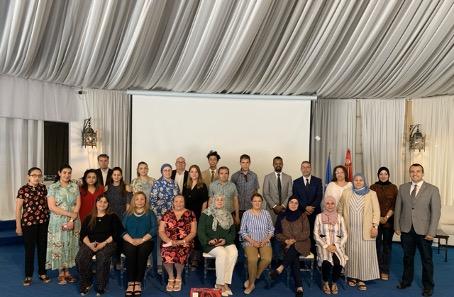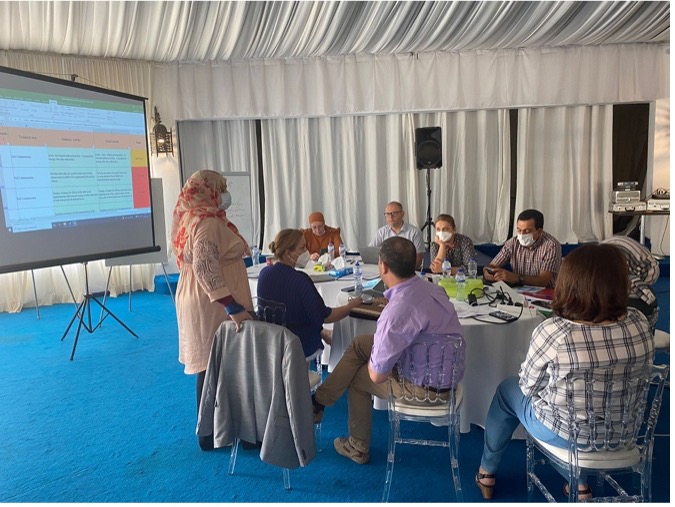
Tunisia Conducts Review, Update and Resource Mapping for the National Action Plan for Health Security
REMAP, WHO, NAPHS
September 13, 2022
Eastern Mediterranean Region
Tunisia
From June the 28th to July the 1st 2022, the National Action Plan for Health Security (NAPHS) review and update workshop was jointly conducted for the first time with Resource Mapping (REMAP) in Tunisia. This resulted in the creation of an updated NAPHS for 2022-2026 and visualization of the health security resource landscape in Tunisia.
The workshop involved national technical experts reviewing the Tunisia NAPHS, determining the status of implementation of the NAPHS activities, reviewing the costing of the activities, and adjusting/adding activities based on lessons learned from the COVID-19 pandemic, resulting in updated activities and costing through 2026. Participants further used the resource mapping (REMAP) tool and process developed by WHO to identify financial and technical support for health security in the country, as well as needs for support.
The workshop brought together over 30 participants including representatives from line ministries: Ministry of Health; Ministry of Industry, Mines and Energy; Ministry of Environment; Ministry of Interior; President’s Office.
The workshop resulted in a revised costing of the country NAPHS to an estimated $24,567,801, adjusted significantly down from the original $45,275,501 costed in 2019. This reduced cost is a result of progress in NAPHS implementation, adjustment of activities, and revision of activity cost estimates. Participants work on determining the status of NAPHS activity implementation further resulted in the determination of 18 percent overall NAPHS implementation status, with detailed visualization of specific implementation status by indicator and technical area. The disruptions caused by the COVID-19 pandemic is the cause for the low implementation level with the health sector rightly focusing on response management at that time.
The resource mapping resulted in the mapping of more than $17.4 million in overall health security interventions in the country (not limited to the NAPHS). Often the partner projects mapped are not supporting the country’s NAPHS and reflect the partners own priorities and areas of interest. This mapping facilitates evidenced-based dialogue between the countries and partners to inform greater alignment between country priorities and partner resources and the leveraging of resources for the national priorities through NAPHS. The resource mapping in Tunisia found that health security support was focused in areas such as food safety, risk communication, antimicrobial resistance and points of entry. Major funding gaps were found through the mapping exercise particularly in the area of immunization, with other areas seen to have large gaps including biosafety and biosecurity as well as radiation emergencies.

Often the partner projects mapped are not supporting the country’s NAPHS and reflect the partners own priorities and areas of interest. This mapping facilitates evidenced-based dialogue between the countries and partners to inform greater alignment between country priorities and partner resources and the leveraging of resources for the national priorities through NAPHS. The resource mapping in Tunisia found that health security support was focused in areas such as food safety, risk communication, antimicrobial resistance and points of entry. Major funding gaps were found through the mapping exercise particularly in the area of immunization, with other areas seen to have large gaps including biosafety and biosecurity as well as radiation emergencies.
The REMAP tool and process was also used in Tunisia to identify human resource needs for the implementation of NAPHS, such as expert technical assistance in specialized areas. Through the resource mapping, more than 80 specific NAPHS activities were identified as in need of technical assistance for completion, with technical areas of particular need including national legislation, policy and financing, antimicrobial resistance, biosafety and biosecurity, emergency response operations, real time surveillance, chemical events, radiation emergencies and others. The full listing, along with the details of health security resource support in the country, is detailed in the online REMAP dashboard that was built for Tunisia.
The REMAP tool and dashboard provides an online platform for visualizing NAPHS implementation in the country and for national focal points to use in the ongoing tracking and analysis of health security resources in Tunisia. The online REMAP tool, launched and piloted in 2022, is further being enhanced to facilitate Tunisia and other countries to engage in continuous tracking of domestic and external financial investments being made in specific NAPHS activities, as well as to update and monitor the overall health security resource landscape.